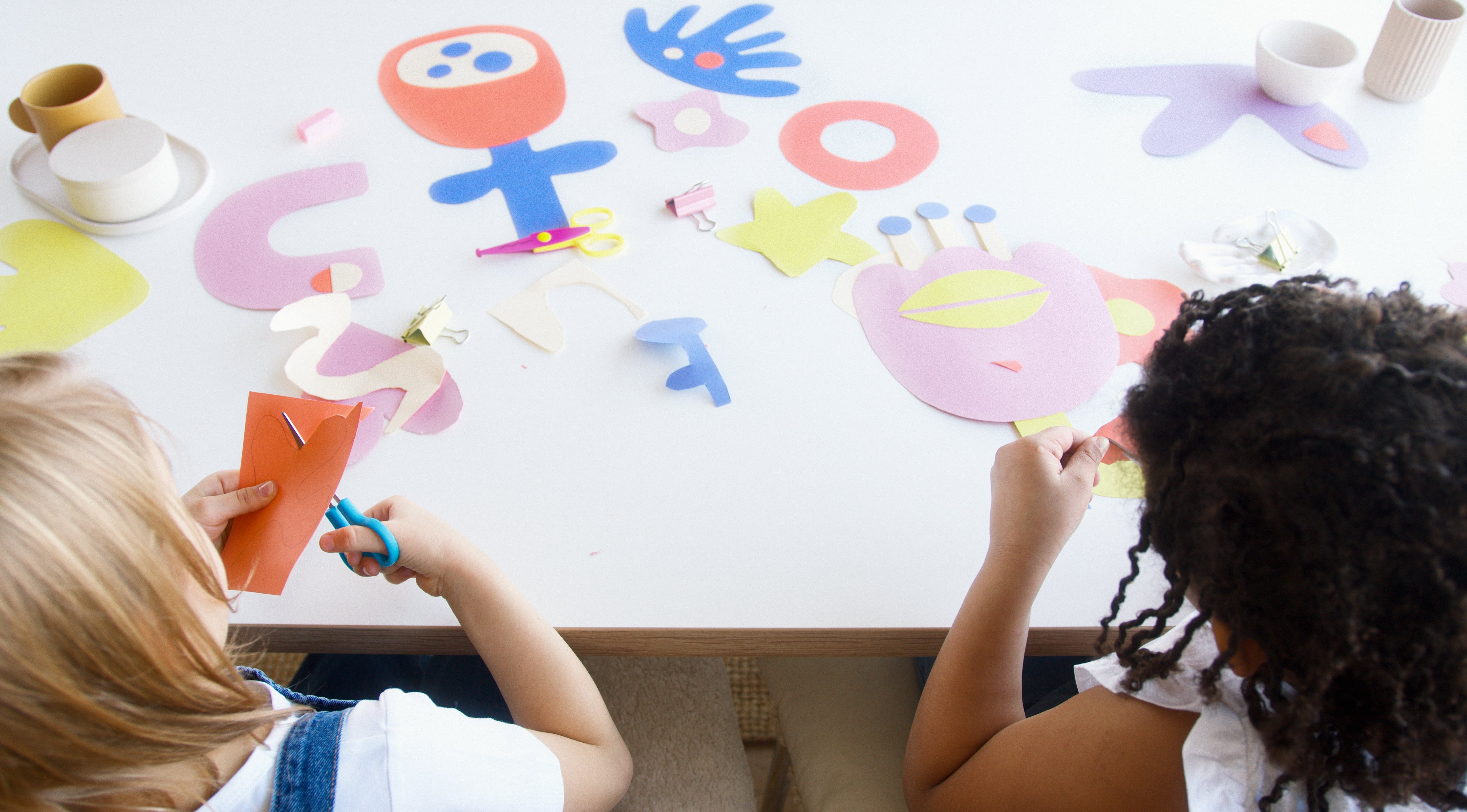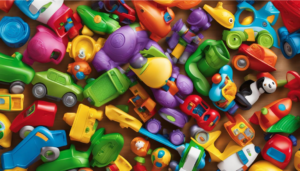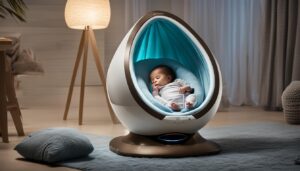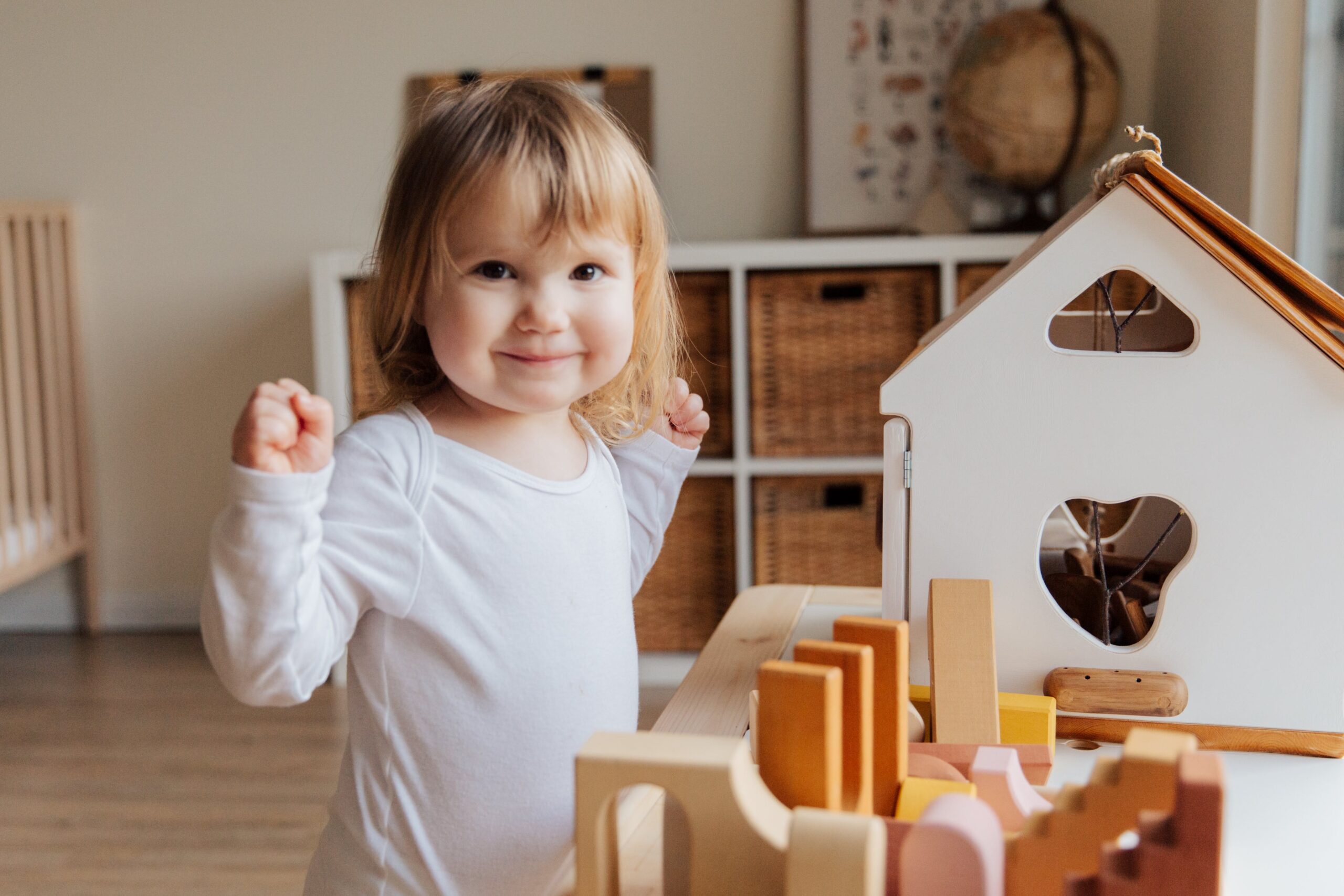
We may earn money or products from the companies mentioned in this post.
If you have a toddler who is struggling to speak or develop language skills, speech therapy toys can aid in their progress and make learning a fun and engaging experience. Choosing the right toys can enhance your child’s speech and language development, build communication abilities, and promote interaction with others.
Key Takeaways:
1. Speech therapy toys can help toddlers enhance their language skills at home in a fun and interactive way.
2. Choosing the right toys can improve a child’s communication abilities and aid in speech development.
3. Speech therapy toys can also support fine motor skills, cognitive development, and social interaction.
4. These toys can be particularly effective for late talkers and children with speech delays.
5. Integrating speech therapy toys into everyday play can maximize the benefits and make learning enjoyable for the child.
Why Speech Therapy Toys Are Important For Toddlers
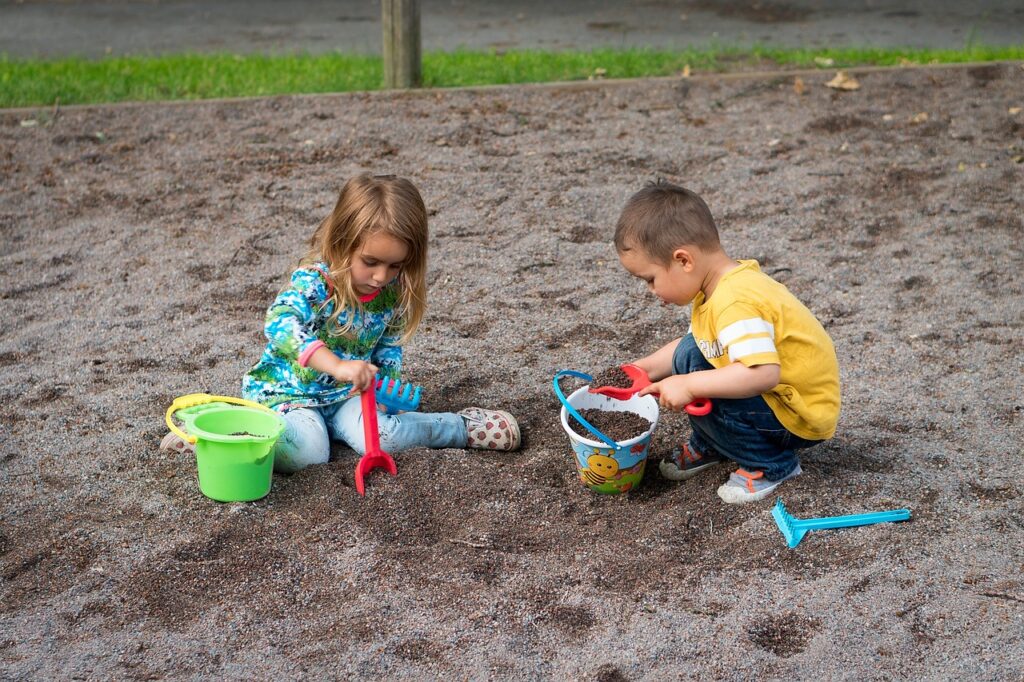
Speech therapy toys play a vital role in a toddler’s language development. These toys provide a fun and engaging way for toddlers to build essential language and communication skills. For children with speech delays, speech therapy toys can be an effective tool in improving their ability to communicate and interact with others.
The benefits of speech therapy toys extend beyond just improving language skills. These toys also promote social interaction, strengthen fine motor skills, and enhance cognitive abilities. By incorporating these toys into a child’s everyday play routine, parents and caregivers can support and encourage their child’s communication abilities in a fun and interactive way.
In fact, speech therapists often recommend specific speech therapy toys that target specific aspects of language development. By design, these toys can help toddlers expand their vocabulary, improve articulation and pronunciation, and enhance their overall speech skills.
For children without speech delays, speech therapy toys can still be an excellent way to build foundational language skills and promote healthy speech development. These toys provide a unique and interactive way for toddlers to learn, grow, and build the skills necessary for effective communication.
How Speech Therapy Toys Benefit Toddlers’ Language Skills

Speech therapy toys are an effective way to improve toddlers’ language skills. These toys not only promote social interaction and strengthen fine motor skills but also help in building and expanding a child’s vocabulary. Speech therapists recommend certain toys to parents as these toys are designed to improve articulation and pronunciation in children with speech delays.
Studies have shown that interactive play with speech therapy toys can provide toddlers with a brain-boosting experience that enhances their language development. These toys enable children to engage in fun and engaging activities that involve communication and problem-solving skills.
Benefits of Speech Therapy Toys for Toddlers:
| Benefits | Examples of Speech Therapy Toys |
|---|---|
| Promote social interaction | Dolls, play kitchen sets, balls |
| Strengthen fine motor skills | Wooden blocks, puzzles, farm sets |
| Build vocabulary | Picture/word cards, animal figurines, shape sorters |
| Improve articulation and pronunciation | Action figures, toy microphones, musical instruments |
Speech therapy toys are not only beneficial for toddlers with speech delays but for all children looking to improve their language skills. Parents can use these toys at home to practice and reinforce the skills their child is learning in speech therapy sessions. By incorporating these toys into their child’s playtime, parents can provide their child with a fun and engaging way to enhance their language and communication abilities.
The Best Speech Therapy Toys Recommended by Speech-Language Pathologists
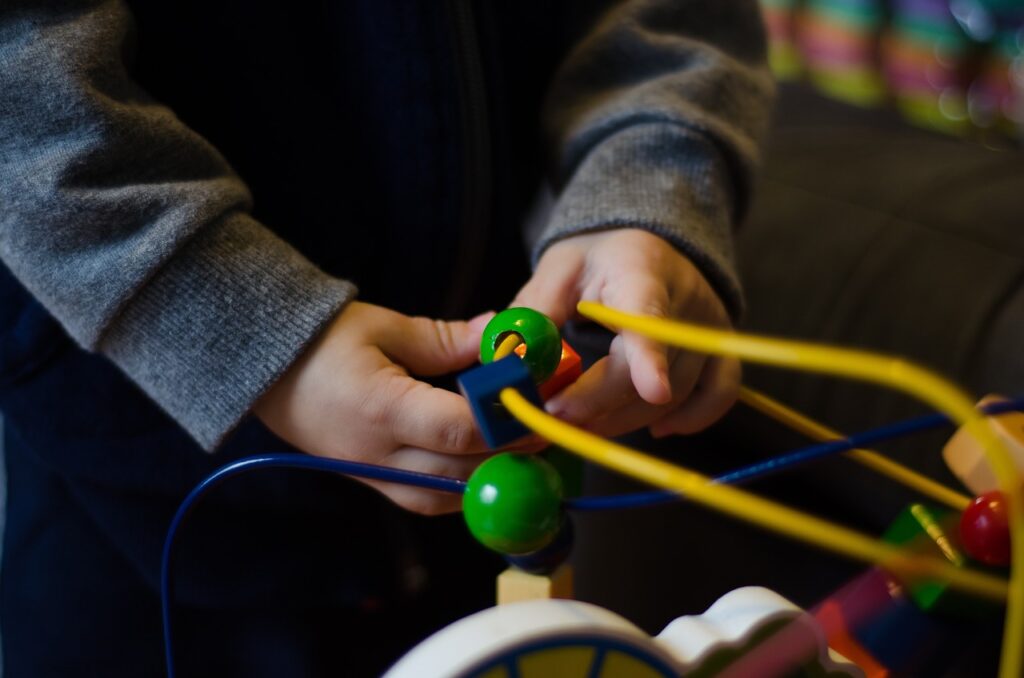
Are you looking for speech therapy toys that have been tried and tested by professionals in the field? Look no further than this list of the best toys recommended by speech-language pathologists. Each toy has been carefully selected based on its ability to support and enhance language development in young children.
| Toy Name | Description |
|---|---|
| Melissa & Doug See & Spell Learning Toy | This interactive puzzle is perfect for promoting letter recognition and spelling skills, while also enhancing hand-eye coordination. |
| LeapFrog Chat and Count Smart Phone | This interactive toy phone is designed to introduce basic counting and number recognition, while also encouraging imaginative play and communication skills. |
| Vtech Busy Learners Activity Cube | This activity cube promotes fine motor skills and hand-eye coordination, while also introducing colors, shapes, and animal names. |
| Fisher-Price Laugh & Learn Smart Stages Piggy Bank | This adorable piggy bank introduces babies and toddlers to counting, colors, and cause-and-effect through fun interactive play. |
| Learning Resources Farmer’s Market Color Sorting Set | This set promotes color recognition, matching skills, and vocabulary development, while also encouraging healthy eating habits and imaginative play. |
| Hape Country Critters Wooden Activity Play Cube | Designed for infants and young toddlers, this wooden activity cube promotes shape recognition, animal names, and fine motor skills, while also encouraging imaginative play. |
Speech therapy toys are a valuable tool for enhancing language development in young children, and these toys come highly recommended by speech-language pathologists. Incorporate them into your child’s playtime routine to foster effective communication skills and a love of learning.
Speech Therapy Toys for Building Vocabulary Skills
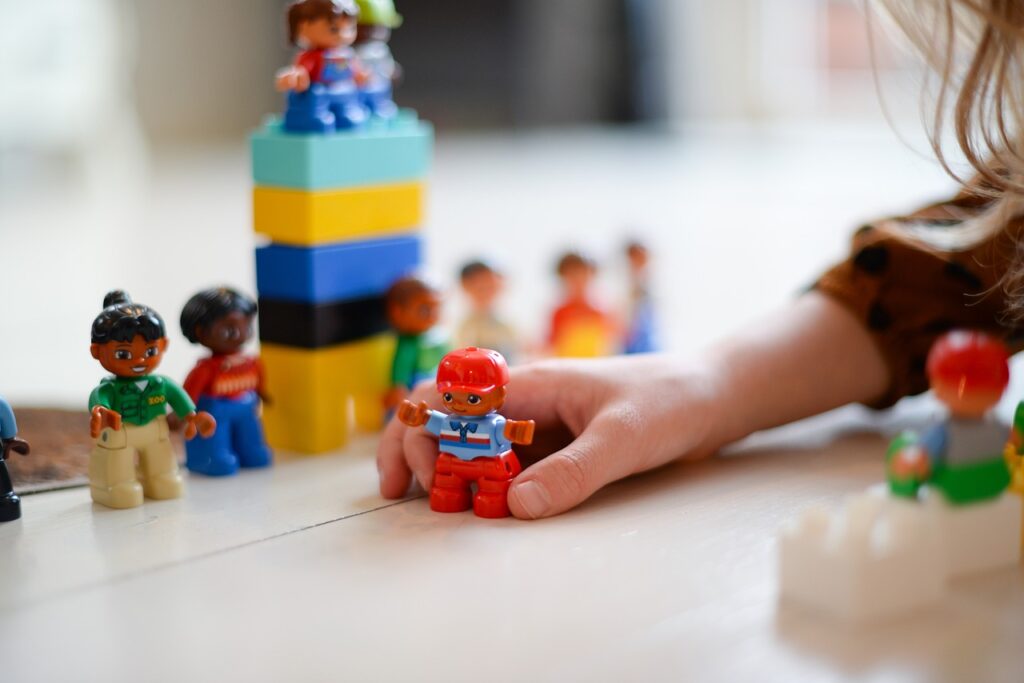
Vocabulary development is vital for toddlers learning to communicate effectively. Speech therapy toys that focus on building vocabulary skills help in enhancing their language abilities. Below are some great speech therapy toys that teach toddlers new words and concepts:
| Toy | Description |
|---|---|
| Animal figurines | These toys are suitable for teaching toddlers animal names, their sounds, and habitats. It’s easy to make this activity interactive by asking kids to match animal sounds to figurines, or categorize them by their habitats. |
| Shape sorter | A shape sorter not only improves fine motor skills but also helps children learn basic concepts like shapes, colors, and sizes. This toy encourages children to say the names of the shapes and colors they are placing in the sorter. |
| Picture books | Picture books are excellent for expanding a child’s vocabulary. Speech therapists recommend books with descriptive images that encourage kids to discuss the scenes they see and the characters in the story. |
| Building blocks | Blocks are great for teaching toddlers about construction, spatial arrangements, and creativity. As children stack blocks, ask them to describe the structure they are creating, or count the number of blocks they are using. |
| Flashcards | Flashcards with pictures and words are perfect for teaching toddlers simple, everyday words, and concepts. These cards can be used in various ways like matching the card with the corresponding object or repeating the word after an adult says it. |
Remember, every child is different and learns at their own pace. Encouraging toddlers to use descriptive words and learning new words towards daily activities, like meals and playtime, can help reinforce vocabulary concepts. Making learning fun through play is an effective way to build vocabulary skills.
Speech Therapy Toys for Developing Articulation and Pronunciation
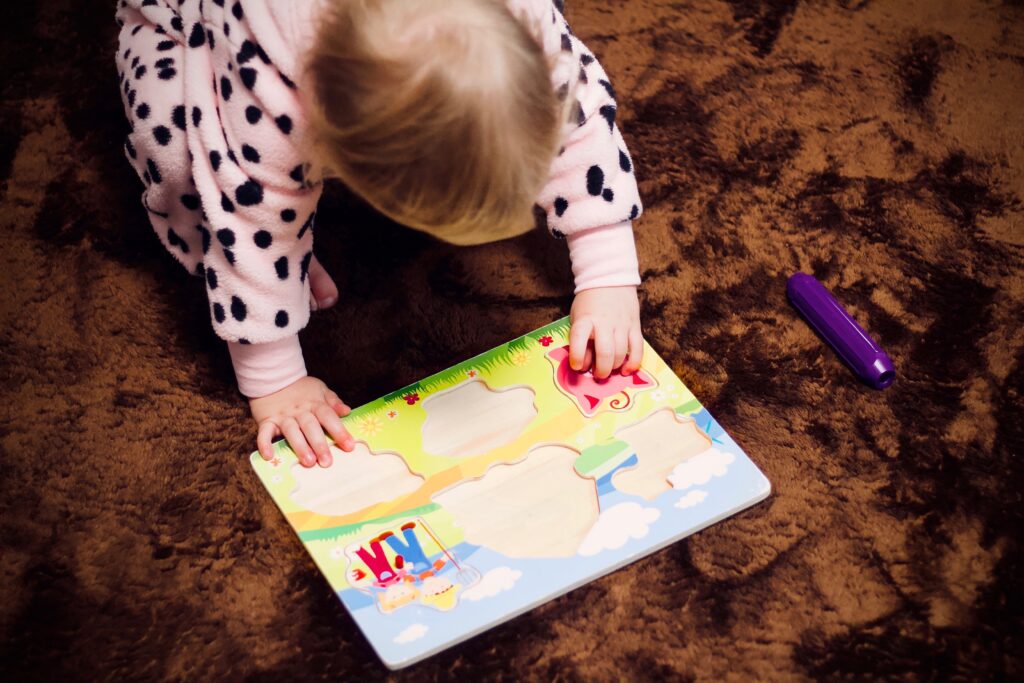
Clear articulation and pronunciation skills are essential for effective communication. As a result, speech therapy toys play a critical role in helping young children practice and improve their articulation and pronunciation skills. These toys provide an engaging and fun way for toddlers to learn the correct pronunciation of words, which will help them to develop their communication skills effectively.
Toys for practicing action words
Action words, such as “jump,” “run,” “clap,” and “dance,” can be challenging for toddlers to articulate correctly. Playmobil’s City Action sets are suitable toys that encourage the use of action words and support language development. Using Playmobil’s city action sets can improve a child’s articulation of action words like, “drive a car,” “fly a plane,” “put out a fire,” and “ride a bike.”
Toys for practicing body parts
It can be challenging for toddlers to learn the proper pronunciation of body parts. Toys like Melissa & Doug See & Spell Puzzle support toddlers in the recognition and pronunciation of body parts. The see-and-spell puzzles, which include the head, eyes, ears, nose, mouth, and body, come with brightly colored wooden letters. These letters offer a tactile experience while also teaching toddlers to spell words out loud and pronounce them correctly.
Toys for practicing animal sounds
Toys that make animal sounds such as VTech Little Apps Tablet, not only assist toddlers in learning new words but also to improve their pronunciation skills. The tablet features various activities that encourage toddlers to learn animal names and sounds while strengthening their communication skills.
| Toy Name | Target Skill |
|---|---|
| Playmobil’s City Action sets | Action Words |
| Melissa & Doug See & Spell Puzzle | Spelling |
| VTech Little Apps Tablet | Animal Sounds & New Words |
Speech therapy toys are a fun and interactive way for toddlers to develop articulation and pronunciation skills while having fun engaging in interactive play. As caregivers and parents, stimulating and encouraging language and communication not only supports the child’s social skills and cognitive abilities, but also fosters a healthy relationship dynamic which builds their confidence.
Speech Therapy Toys for Promoting Social Interaction
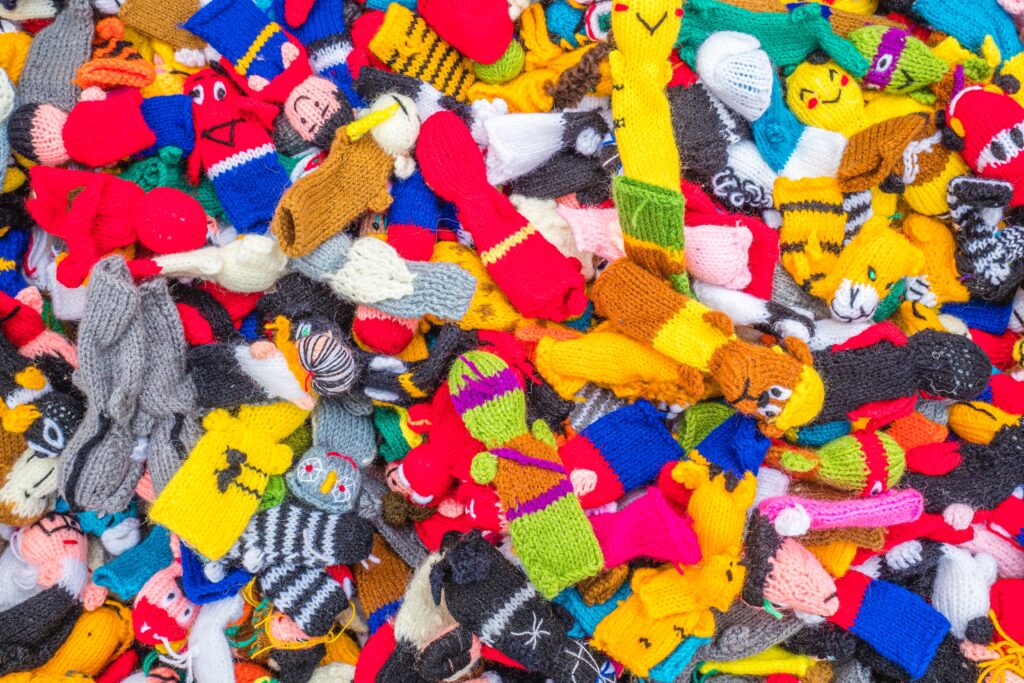
Social interaction is a critical aspect of a child’s language development, and speech therapy toys offer a fun and interactive way to encourage joint attention and foster communication skills with peers and caregivers. Below are some of the best speech therapy toys for promoting social interaction:
| Speech Therapy Toy | Description |
|---|---|
| Board Games | Games like ‘Trouble’ and ‘Chutes and Ladders’ help promote turn-taking, following directions, and vocabulary development, all while having fun with peers and family members. |
| Social Skills Games | Games like ‘Zingo’ and ‘Pop-Up Pirate’ are excellent for fostering social interaction, turn-taking, listening skills, and problem-solving, among other social skills. |
| Puppets | Puppets like ‘Melissa & Doug’ allow children to engage in pretend play, improve verbal and nonverbal communication skills, and promote joint attention. |
| Play Kitchen Set | A play kitchen set like ‘Step2 Fun with Friends Kitchen’ can encourage children to engage in pretend play, practice social roles, and develop their vocabulary and communication skills. |
By promoting social interaction and joint attention, these speech therapy toys can help your child develop their communication skills while having fun with peers and family members. Through interactive play, children learn the value of communication, build social connections, and develop essential social skills that are critical to their overall growth and development.
Speech Therapy Toys for Enhancing Fine Motor Skills

Fine motor skills involve the coordination of small muscles in the hands and fingers and are closely linked to language development. Speech therapy toys that focus on enhancing fine motor skills can contribute to speech production and language acquisition.
Here are some of the best speech therapy toys for developing fine motor skills:
| Toys | Description |
|---|---|
| Wooden Blocks | Building with wooden blocks helps toddlers develop their finger muscles and refine their hand-eye coordination. |
| Puzzle Pieces | Putting together simple puzzles requires precise hand movements and encourages problem-solving skills that can translate to other areas of learning. |
| Farm Set | Playing with a farm set involves manipulating small figures and objects to create narratives, which helps children refine their fine motor skills while also encouraging language development and imaginative play. |
A speech therapist may suggest other fine motor toys specific to a child’s needs and abilities. Remember to choose age-appropriate toys that are of interest to the child to ensure engagement and progress.
Speech Therapy Toys for Improving Cognitive Skills
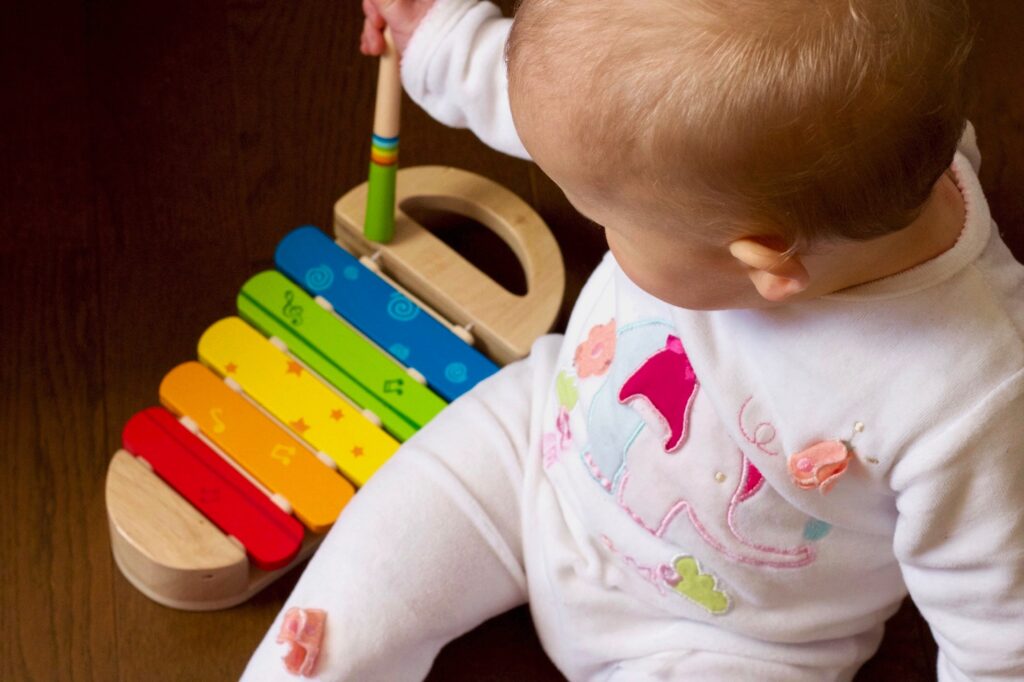
Cognitive skills play a crucial role in a child’s language development. Toys that foster problem-solving, critical thinking, and creativity support the development of cognitive abilities that are essential for language learning. Here are some speech therapy toys that can help improve your child’s cognitive skills:
| Toy | Description |
|---|---|
| Building blocks | Open-ended toys like building blocks allow children to use their imaginations and creativity, promoting problem-solving and critical thinking while constructing structures. |
| Puzzles | Puzzles challenge children to think critically and solve problems by working on recognizing patterns, shapes, and colors. |
| Sensory bins | These toys provide a multi-sensory experience, facilitating problem-solving and critical thinking through fun and stimulating activities. |
| Memory games | These games enhance critical thinking and problem-solving skills as children use their memory to match pairs of pictures. |
These speech therapy toys can stimulate cognitive abilities through open-ended play and activities that require problem-solving and critical thinking. Encouraging these skills at an early age can positively impact a child’s language development and set them up for success in future endeavors.
Speech Therapy Toys for Fun and Interactive Language Learning

Learning a new language can be tedious and challenging for toddlers. Therefore, using speech therapy toys that promote interactive play is an effective way of making language learning fun and engaging. These toys are designed to help children develop their imaginative and pretend play skills, which are critical for enhancing their language skills.
Interactive play helps children learn the meaning of words and how to use them in context. Pretend play, such as playing doctor or cooking, provides opportunities for children to use language functionally and develop their vocabulary. Imaginative play, such as playing with dolls or action figures, encourages children to create storylines and narratives, improving their storytelling and communication abilities.
The following are some interactive speech therapy toys that promote imaginative and pretend play skills:
| Toy | Description |
|---|---|
| Doctor Kit | Encourages children to play pretend doctor and communicate symptoms and diagnoses. |
| Dollhouse | Allows children to create stories, dialogue, and scenarios with their dolls, improving their language and imaginative skills. |
| Talking Farm Set | Interactive playset that features animal sounds, encouraging children to learn animal names and sounds, as well as to ask questions and provide descriptive words. |
| Dress-Up Clothes | Provides opportunities for children to role-play and improve their narrative and social skills. |
Speech therapy toys that promote interactive and imaginative play provide an enjoyable method of enhancing language skills. By incorporating these fun and stimulating toys into everyday play, parents and caregivers can help their toddlers develop their communication abilities while having fun.
Speech Therapy Toys for Late Talkers and Language Delays
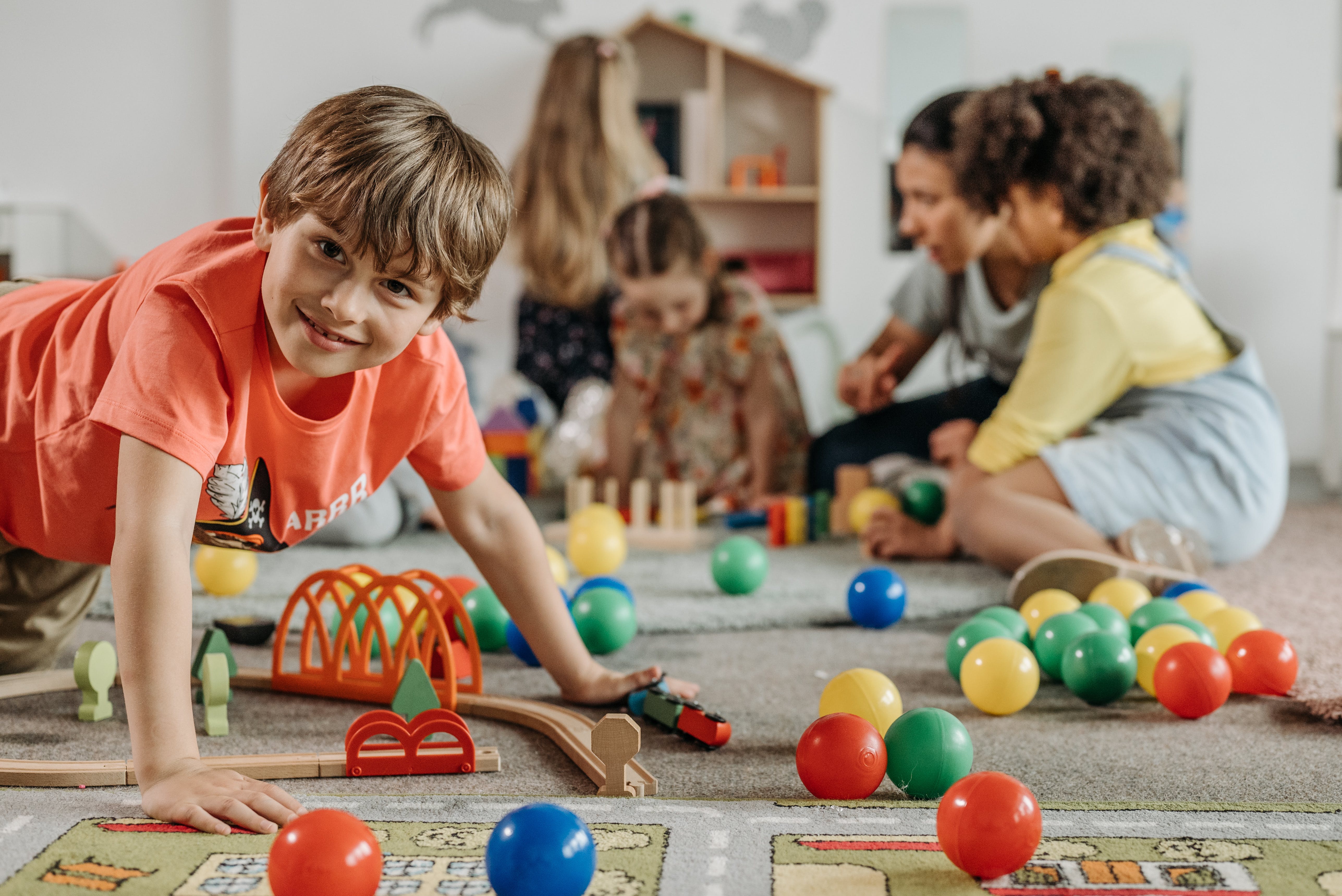
Language delays and late talkers can be challenging, but early intervention can make all the difference. Speech therapy toys can play a crucial role in helping children with language delays develop their communication and language skills.
One of the best ways to encourage late talkers is through interactive play that incorporates speech therapy toys. These toys provide an exciting and engaging way for children to learn and interact with their surroundings, ultimately leading to improved language proficiency.
Some of the best speech therapy toys for late talkers and language delays include:
| Toy | Description |
|---|---|
| VTech KidiBeats | A fun drum set that helps children practice sound imitation and develop rhythm skills |
| LeapFrog My Pal Violet | A plush dog that introduces children to basic words and phrases through interactive play |
| Melissa & Doug Puzzles | Puzzles with recognizable images that help children develop vocabulary and improve problem-solving skills |
| Fisher-Price Little People Farm Set | A farm set that encourages pretend play and introduces children to animal names and sounds |
By incorporating these toys into playtime, parents and caregivers can help their child develop critical language skills, ultimately laying the foundation for a successful future.
Speech Therapy Toys for Toddlers with Speech Delays
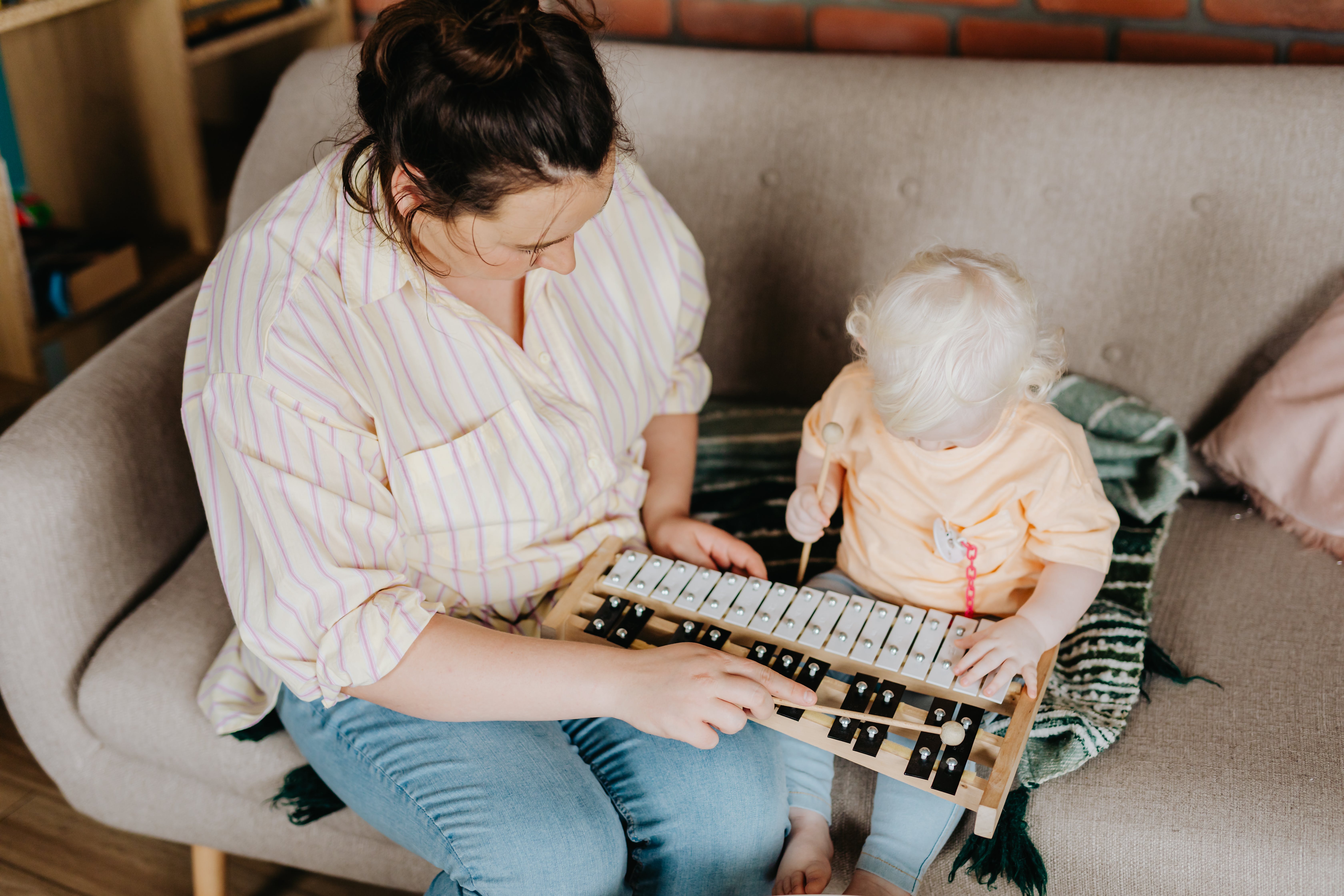
Speech delays can be a challenging obstacle for young children, often requiring targeted support to help them develop language skills and catch up to their peers. In these instances, speech therapy toys can provide an effective and engaging solution.
Speech therapists often recommend speech therapy toys as they can serve as a great motivator for children with speech delays. These toys not only promote play and interaction but also provide opportunities for articulation and pronunciation practice.
Examples of speech therapy toys that have proven successful for children with speech delays include sound puzzles, interactive books, and flashcards. Sound puzzles are excellent for practicing sound imitation and identification, while interactive books and flashcards can help build vocabulary and enhance language comprehension.
Speech therapists also note the benefits of incorporating everyday objects into speech therapy play, as these can be more beneficial to developing appropriate language and communication skills. Simple toys such as blocks or dolls can provide excellent opportunities for imaginative play and speech practice.
The key to selecting appropriate speech therapy toys for children with speech delays is to find toys that align with their interests and abilities, while still challenging them to develop their communication skills. By making speech therapy a fun and interactive experience, children are more likely to stay engaged and motivated, encouraging continued progress towards improved speech and language abilities.
Tips for Choosing the Right Speech Therapy Toys

When choosing speech therapy toys for your child, it is essential to consider their interests, age-level appropriateness, and whether the toys offer open-ended play opportunities. Here are some tips to help you make the best choices:
1. Follow Your Child’s Interests
Children are more likely to engage with toys that interest them. Observe your child’s likes and dislikes to determine what toys would be most appealing. For example, if your child is fascinated by animals, speech therapy toys that feature animal sounds and names are excellent choices.
2. Consider Age-Appropriateness
Make sure the toy you choose is appropriate for your child’s age range. Too easy or too difficult toys might not hold their interest and can be frustrating. Speech therapy toys that gradually increase in complexity are excellent choices for children at all levels of development.
3. Look for Open-Ended Toys
Open-ended toys, such as building blocks, dolls, and action figures, offer many opportunities for imaginative and prolonged play. These toys promote cognitive and language development by encouraging problem-solving and creativity and enhancing fine motor skills. Open-ended toys are preferable to toys with predetermined outcomes or those that are “one and done.”
| Examples of Open-ended Toys | Examples of Closed-ended Toys |
|---|---|
| Building blocks | Puzzles with fixed designs |
| Arts and crafts supplies | Toy cars with tracks |
| Playdough | Electronic games with pre-determined outcomes |
| Dolls and action figures | Board games with set rules |
| Pretend play sets |
4. Opt for Ageless Toys
Toys with a timeless appeal, such as books, classic games, and building blocks, endure through the years and across age ranges. These toys tend to be more durable and offer a broader range of play opportunities than toys that tie into current fads or trends.
5. Avoid Toys That Overwhelm
Choose toys that do not have too many moving parts, buttons, or lights that can distract or overwhelm your child. Too many of these features can cause sensory overload, reducing the chances of effective learning and communication.
By following these tips, you can choose speech therapy toys that complement your child’s interests, development level, and enable discovery and growth in speech and language abilities.
How to Incorporate Speech Therapy Toys into Everyday Play
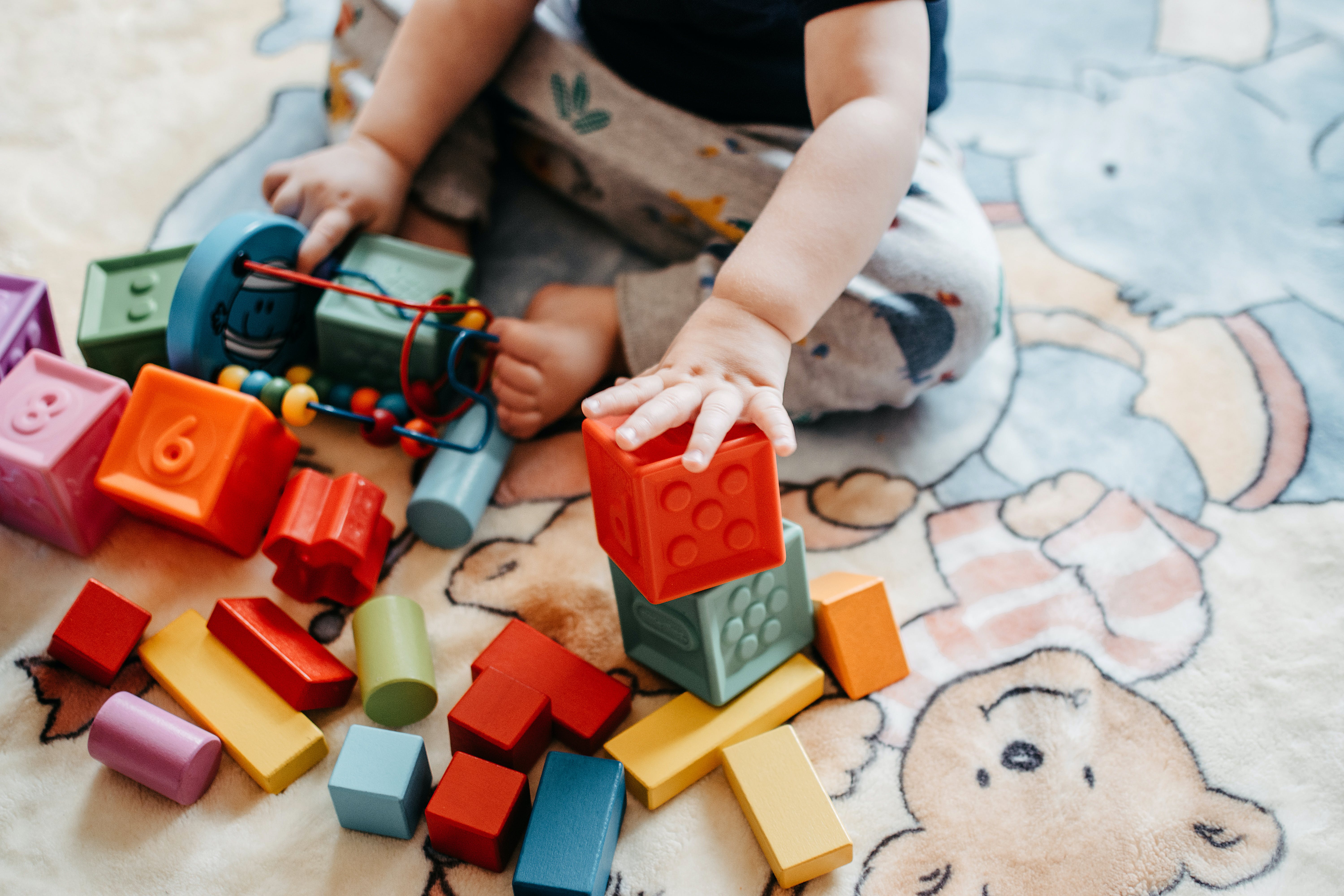
To make the most out of speech therapy toys, it is important to integrate them into a child’s everyday play routine. By doing so, children can have fun while still developing their speech and language skills. Here are some practical strategies for effectively using speech therapy toys:
- Capture the child’s attention: Choose toys that reflect your child’s interests and preferences to ensure they remain engaged and motivated.
- Incorporate verbal routines: Use specific words or phrases repeatedly to reinforce your child’s understanding, such as repeating the names of animals or colors during play.
- Make playtime their favorite activity: Encourage and praise your child’s efforts when playing with speech therapy toys to make it a positive and enjoyable experience.
By incorporating these strategies into everyday play, parents and caregivers can maximize the benefits of speech therapy toys, helping toddlers to develop their speech and language skills in a fun and engaging way.
Conclusion
